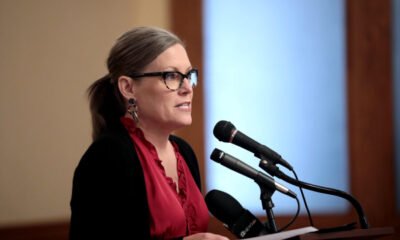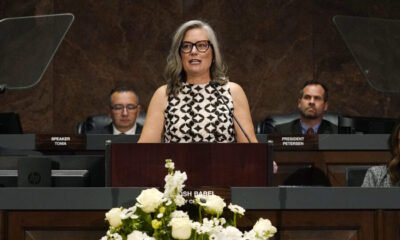arizona
Hobbs’ Appointee Struggles Amid Federal Mandates and GOP Resistance to Diversity Initiatives

A contentious atmosphere enveloped the Arizona Senate as far-right Republican Senator Jake Hoffman escalated his attacks on Governor Katie Hobbs’ nominees. During a May 28 hearing, Hoffman accused Carlos Contreras, nominated to lead the Office of Economic Opportunity (OEO), of lying and violating the Arizona Constitution.
Contreras’s alleged misstep? Complying with grant requirements embedded in Arizona’s federally mandated workforce plans established by Hobbs’ Republican predecessor. Disregarding these requirements would jeopardize crucial funding, yet this rationale failed to appease Hoffman.
“Hoffman is using any excuse to vilify qualified public servants,” asserted Senator Analise Ortiz, a committee member. Her comments came in response to Hoffman’s aggressive questioning of Contreras, focusing particularly on the criteria used for granting funds through the BuilditAZ apprenticeship program.
Hoffman, the chairman of the recently created Director Nominations Committee, has doggedly scrutinized Hobbs’ nominees. This committee has become known for its contentious hearings, often stalling or outright rejecting nominees who fail to align with the Republican majority’s views.
The Senate traditionally confirms agency directors with minimal fanfare; however, Hobbs’ attempts to streamline the process by appointing deputy directors faced legal challenges, culminating in a judge ruling that her actions breached state law.
Contreras, who has played pivotal roles in workforce development and previously worked for Intel for 25 years, faced scrutiny over the BuilditAZ grant scoring system. Hoffman’s inquiry about the inclusion of demographic factors in scoring prompted heated exchanges. “Why are you awarding higher scores based on race or sexual identity?” he demanded.
Contreras explained that the OEO was adhering to federal guidelines, specifically the Workforce Innovation and Opportunity Act (WIOA), aimed at fostering job access for groups historically marginalized in the job market. Hoffman, however, dismissed this, calling it a violation of state law.
As tensions escalated, Ortiz criticized Hoffman’s single-minded focus on race and identity, suggesting that he overlooked a substantial range of other disadvantaged groups. “His line of questioning is indicative of a narrow viewpoint that could hinder the state’s economic strength,” she stated.
The BuilditAZ program’s goals include supporting individuals facing various challenges—ranging from low income to disabilities. Contreras maintained that awarding grants based on these criteria complies with both state and federal law.
Ultimately, the session ended without a recommendation on Contreras’s nomination, as committee members sought legal clarity on the intersection of state and federal laws regarding grant scoring. Legislative Council representatives did not provide clarification following a request for further insight into the legal implications.
Hoffman suggested that all parties consult the U.S. Department of Labor for updated guidance. Meanwhile, Ortiz expressed frustration over the delay in Contreras’ confirmation, urging Hoffman to prepare more thoroughly for future discussions on such pivotal matters.




![Members of the Arizona House of Representatives vote during a third reading of nearly three dozen bills at the Arizona State Capitol on March 4, 2025. [Monica D. Spencer]](https://arizonanews.org/wp-content/uploads/2025/06/SR-347-Secures-53M-in-Third-State-Budget-Draft-Awaiting-400x240.jpg)
![Members of the Arizona House of Representatives vote during a third reading of nearly three dozen bills at the Arizona State Capitol on March 4, 2025. [Monica D. Spencer]](https://arizonanews.org/wp-content/uploads/2025/06/SR-347-Secures-53M-in-Third-State-Budget-Draft-Awaiting-80x80.jpg)












